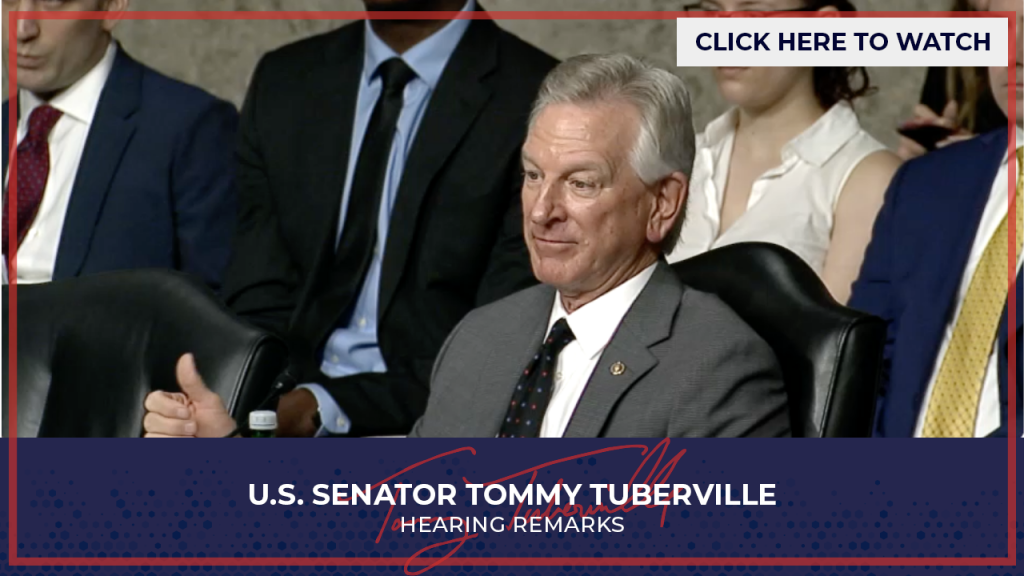“Thank you for taking this on, it is going to be a hard job but anyway we can help you, we are here to help.”
WASHINGTON — In a Senate Armed Services Committee (SASC) hearing today, U.S. Senator Tommy Tuberville (R-AL) questioned President Biden’s nominee for Chairman of the Joint Chiefs of Staff, General CQ Brown. Senator Tuberville asked General Brown about the Department of Defense Joint Staff budget, the upcoming NDAA, and military recruitment shortcomings. The SASC hearing followed Senator Tuberville’s meeting with General Brown yesterday, where they discussed their shared desire to keep politics out of the military, their effort to improve housing for sailors and airmen, and the need to improve military recruitment. Senator Tuberville thanked General Brown for his service to this country.
Excerpts from the exchange in the SASC hearing are below, and a full video of Senator Tuberville’s line of questioning during the hearing can be found here.

TUBERVILLE: “Thank you Mr. Chairman. Good morning, General, thank you for being here. Thank you for your service, and just talking to you yesterday you have moved over 20 times in your career. I don’t think a lot of people understand the complexity of that for the family so thank you for your service. General, I think most of us up here agree that other than foreign countries, 32 trillion dollars in debt is one of our biggest threats to national security. We are broke. In the past, you have criticized the Department of Defense complex bureaucracy and have expressed a desire to improve its inefficiencies. By laws the Joint Staff is capped at around 2,300 personnel with some exceptions. Can you clarify at this time how big is our staff as we speak, do you have a number on that?”
BROWN: “Senator, I don’t have that number. I will have to get that for you. I know it is somewhere around 2,000.”
TUBERVILLE: “Thank you, I’d appreciate that. The House NDAA included a study to look at reducing the size of the office. Do you have any suggestions of where we could look to cut staff and budget to help but not cut back efficiency?”
BROWN: “Not at this moment, if confirmed it will be one of the things that I do take a look at across the Joint Staff and across the aspects of our military department. There are things we can do to increase of efficiency and capability and capacity – those are things I will focus on.”
TUBERVILLE: “You know the FY 23 Budget for the Joint Staff was around 1.2 billion and the proposed FY 24 budget is 1.3 billion. I guess you are familiar with that?”
BROWN: “Not the level of details of the Joint Staff budget because I have been focused on the Air Force budget.”
TUBERVILLE: “Okay thank you, it’s pretty high. But I’d like to you know give us kind of a run down the next time we see you in hearing in terms of where we are with that…is it too much? Not enough? You know we do not want to cut back our military, it is so important, but we also want to be efficient in what we use so I appreciate anything that you could do for us in terms of giving us an update on what you are going to set your team up as because you are going to be the new leader. So, I would hope you keep an eye on that because it is a lot of money. I got an article yesterday that says, “Air Force delays some moves, bonuses as inflation cuts into personnel budget”. Could you explain that? That came from the Stars and Stripes.”
BROWN: “Sure, Senator. As we built our budget a couple of years ago based on the facts of if you add the economic factors as well as force mixed factors based on different career fields and different rank structure we typically will come back and ask for reprogramming. We are working through the process of reprogramming, so we don’t go through an anti-deficiency act and not spend money we don’t have. And so, part of this is for us to be able to work with Congress to get the reprogramming in place so we can actually uphold the programs and impacts that are outlined in that article that we communicated to the Force here recently so we can reverse and minimize the impact to them and their families throughout the rest of this fiscal year.”
TUBERVILLE: “Yeah, and we all know how important it is and I think most of us have talked about it with recruiting – you and I talked about it yesterday – our recruiting is in a tailspin in most areas unfortunately. And with an all-volunteer military we are going to have to do better we got to do better with salaries and incentives and all of those things to get our young men and women involved and interested in our military – it’s so important. We can have all the upper echelon we can get but unless we have the people that actually do the job on the ground and the planes and the sea, we are going to have huge problems because we live in a dangerous world. Thank you for taking this on, it is going to be a hard job but anyway we can help you, we are here to help. Thank you, General.”
Senator Tommy Tuberville represents Alabama in the United States Senate and is a member of the Senate Armed Services, Agriculture, Veterans’ Affairs, and HELP Committees.
###